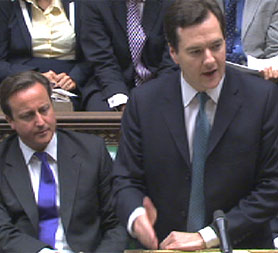Unions condemn spending review job losses
George Osborne said it was the day Britain stepped back from the brink. But union leaders tell Channel 4 News the spending review will lead to “wholesale unemployment”.

The Chancellor confirmed that almost 500,000 public sector jobs were set to be axed as a result of the spending review, leading to warnings from union leaders that the UK was being condemned to “unnecessary wholesale unemployment”.
‘Ideologically driven’
Unison described the cuts as “ideologically driven” and accused the Government of failing to consider that there was a fairer alternative.
General Secretary Dave Prentis said: “For CSR read Cuts Strangle Recovery. The Tories’ ideologically driven, no hope, no ideas, cuts agenda is poisoning the country’s chances of recovery, infecting the public sector and costing 425,000 jobs in the private sector.
The scale of the cuts are a devastating blow to workers and their families whose jobs are in the firing line. Unison
“The much-trailed cuts come as no great surprise, but the scale is a devastating blow to workers and their families, whose jobs are in the firing line.”
Paul Kenny, general secretary of the GMB, said: “After this review, the broadest shoulders will still have the fattest wallets.
“The price for George Osborne’s day of reckoning will be paid by the economy, in the public and private sectors, and those unemployed, for a decade to come.
“In a well leaked, well crafted ideological speech, arrogantly delivered, the demise of public services and the welfare state was laid out in front of us.
“As this plan unfolds and its impact is felt in homes and communities up and down the country, the Tory/Liberal authors will find life increasingly difficult at the ballot box.”
Business reaction
The reaction from business groups to George Osborne’s Spending Review was more sympathetic
John Walker, chairman of the Federation of Small Businesses, said: “We all know we are living in an age of austerity and that these cuts will affect us all, but our members understand that to reduce the public sector deficit, these cuts had to be made.
Business has been clear, the deficit must be tackled, no matter what. British Cambers of Commerce
“The small business community continues to have a vital part to play in driving a credible recovery and taking on new members of staff to help tackle unemployment, so it is now vital that the Government puts a small business programme for growth into action immediately.”
David Frost, director general of the British Chambers of Commerce, said: “Business has been clear, the deficit must be tackled, no matter what. The spending review does the job of setting out how this will be done.
“Overall, the spending review could have been worse for business. While we were disappointed that the Government succumbed to political ring-fencing of some spending areas, cuts to productive infrastructure investment were not as bad as many had feared.”

George Osborne’s Spending Review was also welcomed by the Taxpayers’ Alliance
Director Matthew Sinclair said: “It’s great news that the Government is going ahead with necessary spending cuts to get the deficit under control and that politicians are finally setting out clear plans to deal with the fiscal crisis.
“Many wasteful programmes are being cut and that will mean savings for taxpayers now and in the future.
Sensible and necessary cuts have been announced today but more can be done to deliver good value for hard-pressed taxpayers. Taxpayers’ Alliance
“Unfortunately a number of measures that would save significant amounts of money while minimising the impact on services haven’t been taken, like a freeze in the International Development budget or pay cuts for the best paid public sector staff. Sensible and necessary cuts have been announced today but more can be done to deliver good value for hard-pressed taxpayers.”
Rail fares
Rail commuters will face increased annual hikes in fares from 2012. It’s estimated season tickets could rise by almost 8 per cent.
George Osborne said the rise was needed to pay for new trains and improve passenger conditions.
Campaign for Better Transport chief executive Stephen Joseph said: “The Chancellor’s statement focuses on large-scale transport projects but the reality is cuts in funding for everyday transport. These projects should not be used as a smokescreen to cover up service cuts and rocketing fares on our buses and trains. Understandably, this will enrage people across the country who rely on these essential services.”
Michael Roberts, chief executive of the Association of Train Operating Companies, said: “The Government’s change to regulated fares from January 2012 is part of a wider policy to shift the funding of the railways more towards the passenger, so that the taxpayer pays less. All extra income raised by the Government’s decision will go back to Government, not to train companies.
“Regulated fares account for roughly half of all rail journeys. Train companies will continue to offer a range of good value fares to suit all pockets.”
The Arts
The 25 per cent budget cut announced today by the Department for Culture, Media and Sport (DCMS) will have a “significant impact on the cultural life of the country”, the Arts Council warned today.
It is just one of the bodies that faces cuts after today’s announcement.
This cut will inevitably have a significant impact on the cultural life of the country. Arts Council England
The British Film Institute, English Heritage and the Royal Parks will all lose out.
The Arts Council faces a funding cut of 29.6 per cent and has been told to limit cuts to its own regularly funded organisations, which include orchestras and theatres across England, to 15 per cent.
Alan Davey, Chief Executive of Arts Council England, said: “This cut will inevitably have a significant impact on the cultural life of the country.”
He said implementing the cuts was a “tough task” but added: “We are determined to manage the cuts in the best possible way for the benefit of the whole arts and cultural sector.”
Culture Secretary Jeremy Hunt said: “To deal with an unprecedented financial deficit we have been forced to make some incredibly difficult decisions. But, in the current economic climate, this is a good settlement for DCMS’s sectors”
Relief for scientific community
Britain’s scientists and engineers reacted warmly to the news that research budgets have been frozen, but not cut writes Science Correspondent Tom Clarke. While this translates to around a 10 per cent cut in real terms over four years – it is far less than many of them feared.
"It is wonderful to learn that Government has listened to the scientific community. Collectively we have made the case that funding science is not a cost but a way to invest in creating a stronger economy which is the best way to guarantee the recovery that will benefit everyone,” said Professor Colin Blakemore, former head of the Medical Research Council.
But it would be wrong to conclude that a 10 per cent cut won’t seriously impact research and development in the UK – a sector which will be central to Britain’s economic recovery in the medium to long-term. A report by the Royal Society in March warned that any cut to UK science funding could lead to “brain drain,” to countries which have responded to the financial crisis by boosting research budgets. In response to the downturn US has increased science funding by $21 billion. France and Germany have also committed to increase central education and research budgets.
Prof Peter Weissberg, Medical Director, British Heart Foundation, said he was relieved that science has been spared the deepest of cuts. But “even at about 10 per cent down, we’ll be playing catch-up in an international field which could see UK science left behind".
”It’s not yet clear where the axe will fall for Britain’s scientists and engineers. Money for different research areas such as medicine, physics and engineering is distributed by the research councils. They have been asked to argue among themselves how the 10 per cent cut burden is shared
-
Latest news
-
Windrush scandal: returning to the UK after a forty year wait6m

-
Netanyahu ‘survival’ depends on ‘expanding war’ says head of Palestinian National Initiative5m

-
Proposed law change could strip parental rights from paedophiles5m

-
Hugh Grant settles privacy lawsuit against The Sun newspaper publisher2m

-
Post Office Scandal: what did top executive know?6m

-




